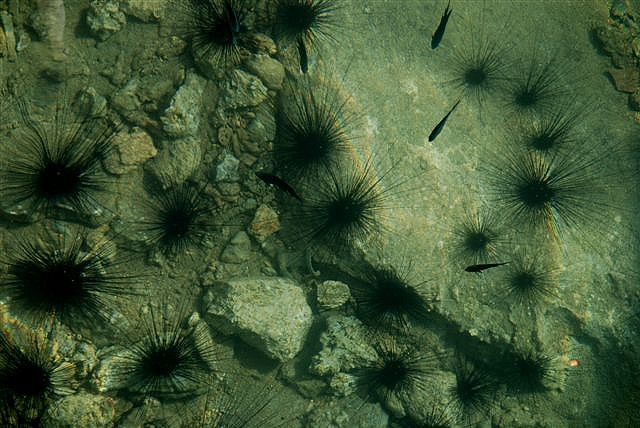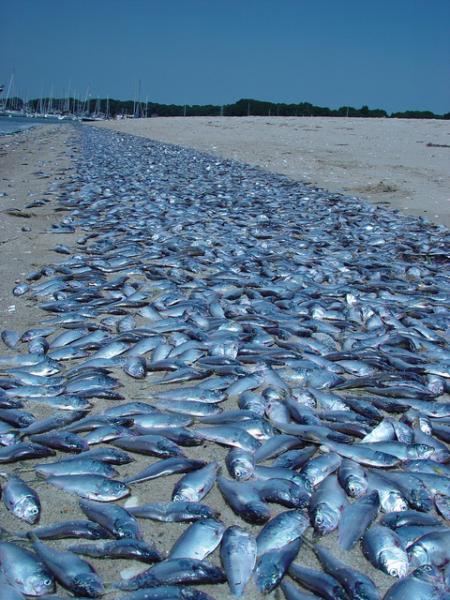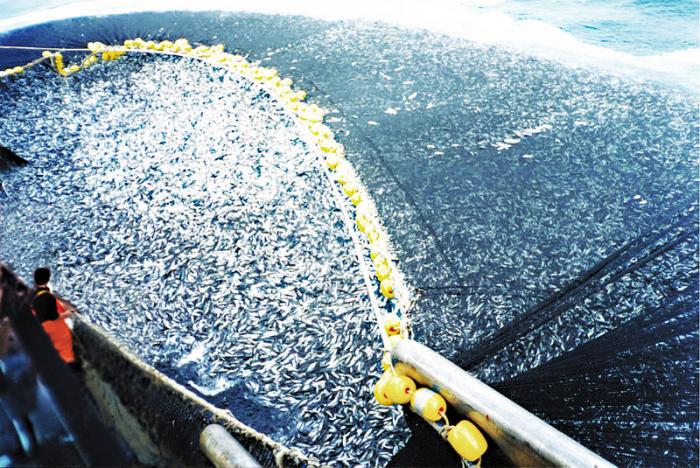Fisheries
The world’s fisheries are in a state of crisis. Environmental changes and pollution combined with over-fishing and the rise of invasive species are deteriorating the health of the global fishing industry. Nothing is more symptomatic of this decline than the history of cod in the North Atlantic. Cod has long been a staple diet for societies in the region including Iceland and Scandinavia, and a century ago, they were so abundant that whole fisheries thrived on this one fish. Now, however, cod has been so overfished that conflicts over fishing rights have erupted (between Iceland and England in the 1950s to 1970s, dubbed the "cod wars") and populations have plummeted. The same countries that depleted the stock of cod are now overfishing other species, including haddock and skate.
All of this comes at a time of growing consumption of fish. The Intergovernmental Panel on Climate Change (IPCC) predicts that global fish production will increase from 2012 to 2020, but not as rapidly as will demand. Wild fish will comprise the majority of fish caught in sub-Saharan Africa and the US, but in other parts of the world, aquaculture will increase in importance. It could be that aquaculture or fish farming will dominate fisheries by the end of the century. However, aquaculture has its own set of issues. For carnivorous fish such as salmon, fish farming utilizes a considerable supply of feeder fish. Moreover, fish farms are at a significant risk of environmental problems and are susceptible to outbreaks of disease.
The superb overview of the state of the modern ocean by Jeremy Jackson identifies several distinct habitats and ecosystems that are in a significant state of decline:

- One of the richest habitats for fish are forests made up of giant seaweed called kelp. Overfishing has led to the removal of the predators of herbivores such as sea urchins that consume kelp, and this had caused a drastic reduction in the area of this key habitat, especially in the Northern Hemisphere.
- Seagrass beds are another key habitat, especially in tropical and subtropical lagoons and bays and on continental shelves. These beds are vital habitats for manatees, sea turtles, rays, and sharks as well as invertebrates such as oysters. The area of seagrass beds has declined by about 30% since 1980 due to nutrients in sewage and run-off from agricultural areas.
Healthy and unhealthy seagrass bed
- On the coast and over the continental shelf, commercial overfishing has depleted ecosystems and destroyed habitats over large swaths of coastline and further out on the continental shelves. Fishing using trawling nets has depleted fish stocks as well as shellfish beds. The total loss of biomass has been enormous, and a number of large fish species are now absent from these environments.
- Pollution of the coastal environment has led to eutrophication and red tides of toxic dinoflagellates (see Module 7). This has caused significant problems for coastal fisheries around the world. On top of this, introduction of species such as lionfish, which come from home aquariums and are fierce predators of other fish, have often turned out to be invasive.

- We have documented the decline to coral reef ecosystems in Module 7. Destruction of reef tracts, due to physical damage, pollution, and bleaching, has led to the loss of habitats for many species of fish and invertebrates. As we saw in Module 7, algae are taking over many areas of modern reefs.
- Phytoplankton at the base of the marine food chain are also suffering. Some estimates suggest a 40% reduction in phytoplankton production since the 1950s. Such a scale is certain to have an impact on all marine food webs.
As a result of all of these changes, over 100 species of fish are currently on the extinction watch list. Estimates suggest that biomass produced by fish has declined by more than 50% in the last 40 years. Some scientists are warning of a complete collapse of marine fisheries by 2050, which would be a devastating problem for communities that rely on fish as the major source of food.
The following video describes the stark future of global fisheries as a result of overfishing:
Video: Overfishing - The consequences (2:34) This video is set to music and not narrated.
[MUSIC]
TEXT ON SCREEN: For every pound [of seafood] that goes to market, more than 10 pounds, even 100, may be thrown away as by-catch. Sylvia Earle
90% of large predatory fish such as tuna, swordfish, sharks, are now gone.
90% of large whales, 60% of the small ones are also now gone from estuaries and coastal waters. 100 million sharks are killed every year. 100,000 albatross are killed every year while fishing!
A study done by the Dalhousie University of Canada projects that by 2048 all the species that we fish today will be extinct. That is in 38 years.
So, aside from those of us who enjoy the occasional salmon sashimi, spicy tuna rolls, salted grouper, or pan roasted Chilean sea bass, why should humanity care about the extinction of these species? We are destroying a food chain system kept in balance by evolution through millennia. There will be no big fish to eat the medium fish. And too many medium fish to eat all the small fish. And then there is no one to eat the really small organisms: the plankton, the algae, etc.
The result, slime: shorthand for the increasingly frequent appearance of dead zones, red tides, and jellyfish that, when they die out, sink to the bottom of the ocean to mix with dissolved oxygen while they rot. Nothing can live in these oxygen-depleted waters, except… bacteria. So it’s like we are getting rid of the complex, sophisticated organisms that took millions and millions of years to develop.
And… replacing them with the most basic ones. Not the wisest of evolutionary strategists, are we?
Green Forum Oceans
abc planet

